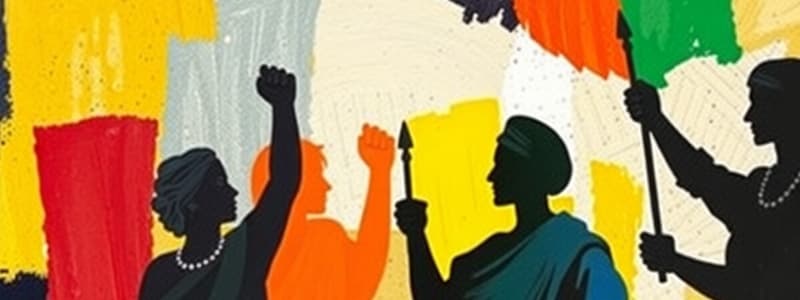Podcast
Questions and Answers
What are the primary grounds upon which the State is prohibited from discriminating against a citizen?
What are the primary grounds upon which the State is prohibited from discriminating against a citizen?
The State shall not discriminate against any citizen on grounds of religion, race, caste, sex, place of birth or any combination of those factors.
Name two types of public places that citizens should not have restricted access to based on religion, race, caste, sex or place of birth.
Name two types of public places that citizens should not have restricted access to based on religion, race, caste, sex or place of birth.
Based on the text, citizens should not have restricted access to shops and public restaurants, amongst other places based on those grounds.
Can the state make special provisions for women and children? Answer yes or no.
Can the state make special provisions for women and children? Answer yes or no.
yes
Besides women and children, name one other group of people for whom the State may make special provisions.
Besides women and children, name one other group of people for whom the State may make special provisions.
Can the State discriminate against citizens based on their parent's social class? Answer yes or no.
Can the State discriminate against citizens based on their parent's social class? Answer yes or no.
What categories of people can the State make special provisions for in regards to education?
What categories of people can the State make special provisions for in regards to education?
Based on the text, what type of educational institution is excluded from the special provisions?
Based on the text, what type of educational institution is excluded from the special provisions?
According to the document, how is 'economically weaker sections' defined?
According to the document, how is 'economically weaker sections' defined?
What is the maximum percentage of seats that can be reserved for economically weaker sections, according to the text?
What is the maximum percentage of seats that can be reserved for economically weaker sections, according to the text?
Can reservations be made for economically weaker sections who are already part of the classes mentioned in clauses (4) and (5)?
Can reservations be made for economically weaker sections who are already part of the classes mentioned in clauses (4) and (5)?
Flashcards
Prohibition of Discrimination in Article 15
Prohibition of Discrimination in Article 15
The government cannot discriminate against citizens based on their religion, race, caste, sex, or place of birth.
Equal Access to Public Places in Article 15(2)(a)
Equal Access to Public Places in Article 15(2)(a)
This clause ensures that citizens cannot be denied access to places like shops, restaurants, hotels, and entertainment venues based on protected characteristics.
Equal Access to Public Resources in Article 15(2)(b)
Equal Access to Public Resources in Article 15(2)(b)
Citizens cannot be prevented from using public resources like wells, tanks, bathing ghats, roads, and places of public resort due to their religion, race, caste, sex, or place of birth.
Special Provisions for Women and Children in Article 15(3)
Special Provisions for Women and Children in Article 15(3)
Signup and view all the flashcards
Special Provisions for Backward Classes and Scheduled Castes/Tribes in Article 15(4)
Special Provisions for Backward Classes and Scheduled Castes/Tribes in Article 15(4)
Signup and view all the flashcards
Special Provisions for Socially and Educationally Backward Classes
Special Provisions for Socially and Educationally Backward Classes
Signup and view all the flashcards
Special Provisions for Economically Weaker Sections
Special Provisions for Economically Weaker Sections
Signup and view all the flashcards
Reservation for Economically Weaker Sections in Educational Institutions
Reservation for Economically Weaker Sections in Educational Institutions
Signup and view all the flashcards
Defining "Economically Weaker Sections"
Defining "Economically Weaker Sections"
Signup and view all the flashcards
Balancing Reservations
Balancing Reservations
Signup and view all the flashcards
Study Notes
Article 15: Prohibition of Discrimination
- General Prohibition: The State cannot discriminate against citizens based on religion, race, caste, sex, or place of birth.
- Equal Access to Public Facilities: Citizens cannot face disabilities, liabilities, restrictions, or conditions regarding access to shops, restaurants, hotels, entertainment venues, and public facilities like wells, tanks, bathing ghats, roads, maintained or dedicated to public use.
- Special Provisions Allowed: The article allows the State to make special provisions for women and children.
- Backward Classes: The State can make special provisions for the advancement of socially and educationally backward classes, Scheduled Castes, and Scheduled Tribes. This includes their admission to educational institutions, including private ones.
- Economically Weaker Sections: The State can make special provisions for economically weaker sections of citizens, not included in previous provisions, regarding admission to educational institutions (this includes private institutions). The reservation for this group would be in addition to existing ones and capped at 10% of total seats per category.
- Definition: "Economically weaker sections" are determined by the State based on family income and other economic disadvantage indicators.
Studying That Suits You
Use AI to generate personalized quizzes and flashcards to suit your learning preferences.




